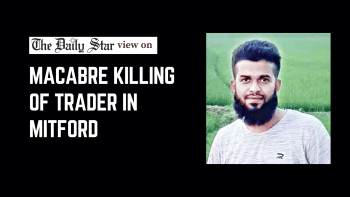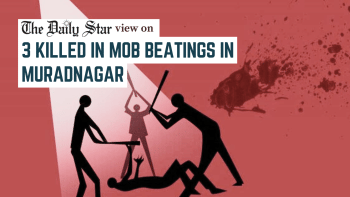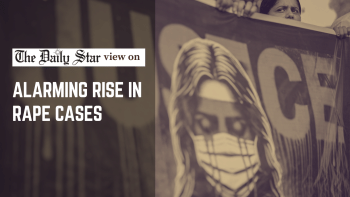The Barishal-1 constituency comprises two upazilas -- Gournadi and Agailjhara.
If one visits the upazilas now, just two weeks before the national election, they may get an idea about the polls seeing thousands of posters in favour of Awami League and some of Islami Andolan Bangladesh.
A question may arise in their minds of whether BNP has fielded a candidate there. It's because they won't find any poster supporting the party's candidate except in very few areas in the southern part of Gournadi. They would not also find a party or electoral office in any of the upazila headquarters, let alone any visible campaigning.
The AL leaders said the development works done by current AL lawmaker Abul Hasanat Abdullah had left no scope for the BNP to come up with any issues before the election. On the other hand, BNP has nominated Zahir Uddin Swapan, who has not been in the area for many years, leaving him disconnected with both party activists and voters, they added.
But, BNP leaders allege they cannot carry out campaigning openly due to "rowdy activities" of the AL men and "inaction of police". "We cannot even move freely. How can we set up an electoral office?" Gazi Abu Bakar Siddique, joint convener of Gournadi upazila unit BNP, said.
In the last five general elections after restoration of democracy in early 90s, Hasanat was elected as lawmaker from Barishal-1 thrice. Another AL leader, Talukder Md Yunus, won in the 2008 election. Swapan was elected in this seat in 2001. Being a reformist leader, he did not get nomination in 2008.
Gournadi is considered as a stronghold of BNP, while minority-dominated Agailjhara is an AL stronghold.
The Daily Star correspondents on Saturday visited several areas of the constituency and talked with more than 25 people including leaders and activists of both parties.
While entering Gournadi upazila through the Dhaka-Barishal Highway, the correspondents saw a few posters of Swapan in Mahilara and Batajore areas.
"We saw some posters in our Ashokathi [next bus stop of Batajore] area after Swapan Saheb entered the constituency on Tuesday with a large number of people. Now we do not see him any longer and the posters have also disappeared," said an auto-rickshaw driver.
At Gournadi bus stand, around 25 leaders and activists were found at AL upazila office seeking votes through loudspeakers. No BNP office was seen there.
"The opposition leader [Swapan] has come to the area and held some programmes. But, he has failed to draw public attention and thus refrained from campaigning," Mizanur Rahman, a former central leader of Bangladesh Chhatra League, said at the office.
However, Abu Bakar alleged that they could not conduct campaigning due to pressures from the AL men, who have already attacked the houses of some BNP men in Mahilara.
He claimed they wanted to hold a meeting at Nalchira on Friday, but the AL men gathered there and forced them to call off their programme. They tried to hold the meeting again on Saturday, but the AL men held a counter programme there, he added.
"So, we did not hold our programme to avert a clash. Our leader [Swapan] talked with the OC, who did not take any action," the BNP leader said.
"We are now holding house meetings and giving necessary directives to our leaders and activists. The situation is not favourable for open campaigning now," he added.
Earlier on December 3, Swapan sent a letter to the Election Commission seeking security for his family and party activists under the Representation of the People Order (RPO).
He claimed he was afraid of attacks as Gournadi upazila unit AL General Secretary Harisur Rahman was delivering provocative speeches against him at rallies and meetings.
The BNP candidate on Friday told The Daily Star that at least 35 activists were injured in attacks and they were prevented from campaigning.
"Actually, they have kept me virtually confined to my house," Swapan claimed.
Swapan called a press conference today at 10:00am at his Shorikul residence in Gournadi upazila to discuss these issues.
Harisur denied the allegations straightaway.
Swapan, who was not seen in the area in last 10 years, was making false allegations finding no other issues to draw public support for, he claimed. "We don't need to prevent him. Development works [done by Hasanat] are enough to win public support."
On allegations of forcing BNP leaders to join AL ahead of the election, Harisur said, "No, they are willingly joining Awami League after seeing the development works."
Around 500 BNP men from Batajore union joined AL on Saturday, he informed.
On BNP's poor campaigning in Agailjhara, a local AL leader said the party was not organisationally strong in the upazila.
"Besides, an untold repression was carried out against the minority community in Agailjhara and Gournadi after the 2001 election when Swapan was elected. So, BNP has no moral ground to seek votes here," the leader told The Daily Star asking not to be named.
SM Afzal Hossain, general secretary of Agailjhara upazila BNP, who is now in Dhaka, said they would hang posters within a day or two.
Hinting at internal feud behind poor campaigning, he said either Abdus Sobhan or Akand Kuddus was supposed to get the nomination, but the party had chosen him (Swapan).
"We have to obey the party decision," he observed.



 For all latest news, follow The Daily Star's Google News channel.
For all latest news, follow The Daily Star's Google News channel. 








